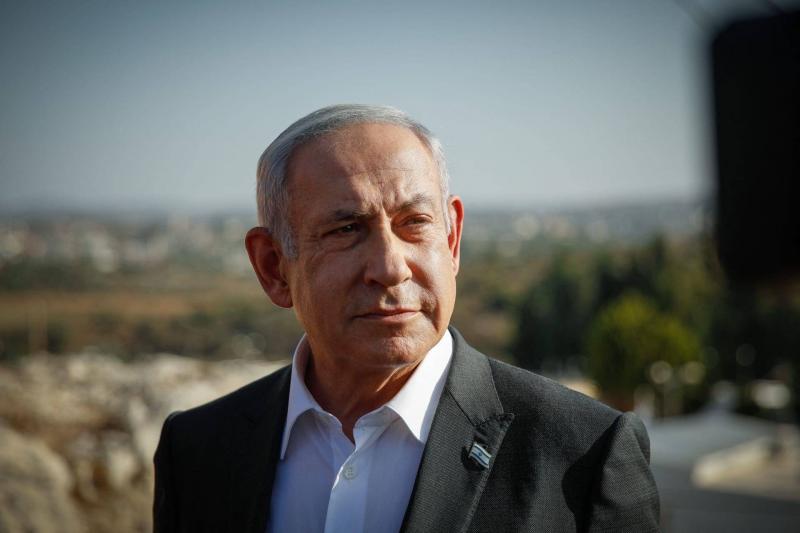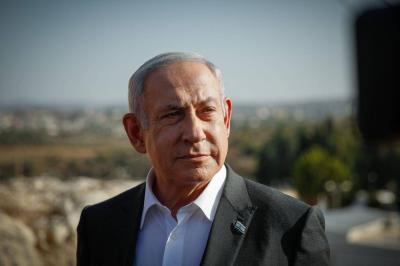Inside the Israeli Defense Ministry, Prime Minister Benjamin Netanyahu oversaw the process of releasing hostages held by the Palestinian Islamic resistance movement, Hamas. Outside, their families gathered in a square in Tel Aviv around Benny Gantz, Netanyahu’s main political rival. Gantz, a former army commander and opposition leader who joined Netanyahu's war cabinet last month, clearly requested a television crew to turn off the camera and leave him with the families. Later published photos showed him embracing members of the crowd.
In the face of massive criticism for failing to prevent the shocking infiltration of Hamas into Israel on October 7, Netanyahu largely avoided the spotlight while fighting a war on two fronts: one against Hamas and the other for his political survival. Netanyahu, 74, has long maintained an image as a tough-security politician against Iran, backed by the army to ensure that Jews never suffer another Holocaust. However, his premiership has seen the deadliest incident in Israel’s 75-year history.
Israelis have rejected some ministers in Netanyahu's government, accusing them of failing to prevent Hamas militants from entering from Gaza in an attack that killed 1,200 people, kidnapped 240 others, and plunged the country into a state of war. In separate incidents, at least three ministers faced ridicule and abuse when they appeared in public, highlighting the level of public anger over the failures that allowed Hamas to carry out the attack.
Netanyahu acted as if he were the victor. Earlier this week, his office released videos showing him in the operations room of the Defense Ministry. Netanyahu visited Gaza yesterday and his office later published images of him wearing a helmet and a bulletproof vest while meeting soldiers and leaders.
Netanyahu, known as "Bibi," is expected to benefit from the war, which will likely lead to further delays in his ongoing corruption trial that has lasted three and a half years, as well as the postponement of a government inquiry into the causes of the surprise attack on Israel under his leadership. He may also hope that mingling with generals will help salvage his reputation through his war management and the return of hostages while refusing to acknowledge responsibility and declining to answer a rare question at a press conference about whether he would resign.
However, Anshil Pfeffer, the Prime Minister's biographer, stated, “No matter how long Netanyahu manages to stay in power, he won’t save his reputation.” He noted, "He is now irreversibly branded with the failure to prevent the massacre of October 7, due to the strategy of allowing Hamas to maintain control in Gaza with its military arsenal and the utterly inadequate civil relief efforts by his government since October 7."
Pfeffer, the author of "Bibi: The Turbulent Life and Times of Benjamin Netanyahu," published in 2018, mentioned that polls in recent weeks have shown that Israelis trust the security establishment more than they trust Netanyahu to lead the wartime efforts. He stated, “The failure of October 7 is his legacy. No success achieved by Israel thereafter will be attributed to him, no matter what.”
Netanyahu has pledged indefinite control over security in Gaza, increasing uncertainty about the fate of the territory subjected to an Israeli assault for seven weeks before a temporary ceasefire with Hamas was reached, involving the release of hostages in exchange for Israel freeing Palestinian prisoners. Gaza's health authorities report that the war has killed approximately 14,800 Palestinians and displaced hundreds of thousands.
Netanyahu, who has served the longest term as Israel's Prime Minister, has survived many political crises and has returned to power several times, needing no new elections for three years if his coalition government remains intact. Abraham Diskin, emeritus professor of political science at the Hebrew University of Jerusalem, stated, “I know him well; he focuses on what he is doing. He’s really a very hardworking person, managing a war now and keeping it going, like a juggler with six balls in the air. To keep them in the air, he needs to focus.” He added, “There’s no point in going out and facing people who are shouting at you and truly hate you, so he decided not to do that.”
The presence of Gantz in the government provides stability for Netanyahu. Gantz, tall and thin with blue eyes and an easygoing demeanor, joined the war cabinet after Hamas's attack to unite the country behind a campaign to eliminate the Palestinian movement and return the hostages. Gantz, who spent nearly 40 years in the military and belongs to the political center, provides Netanyahu's right-wing Likud party with a more stable government and reduces the influence of far-right and religious coalition partners.
While they may be united in war, they are politically at odds. Gantz, Netanyahu, and Defense Minister Yoav Galant from Likud have held joint press conferences. A picture from one of these conferences circulated on social media showing Netanyahu alone while Galant and Gantz stood together at the side.
A poll conducted on November 16 showed that the coalition government led by Netanyahu, which won 64 seats in the November 2022 elections, would today receive 45 seats in the 120-member Knesset compared to 70 seats for parties led by Gantz's National Unity Party, which is enough to take power. The Mano Geva polling institution and the Midgam company conducted the poll for Israeli Channel 12 a week before Qatar announced the hostages deal. It included 502 participants with a margin of error of 4.4 percentage points.
Gantz has little of Netanyahu’s experience or talent on the global stage, and critics say his easygoing style shows hesitation and a lack of principles. Gantz describes himself as possessing greater resolve. He is often seen as just as hardline against Palestinians as Netanyahu, having stopped short of committing to the state they seek, though he has supported efforts to resume peace talks with them in the past.
Israelis have voted five times in the past five years. No party has ever won a parliamentary majority, always necessitating the formation of coalition governments from various parties. No one proposes holding elections again amid the ongoing war. However, opposition leader Yair Lapid, who belongs to the center, stated two weeks ago that it is time to replace Netanyahu without elections. He indicated that there would be widespread support for a unity government led by Netanyahu's right-wing Likud party, but no one from the party has stepped forward to challenge Netanyahu. Lapid wrote on X platform, "We cannot enter into another election cycle next year while we continue to fight and explain why the other side is a catastrophe."




